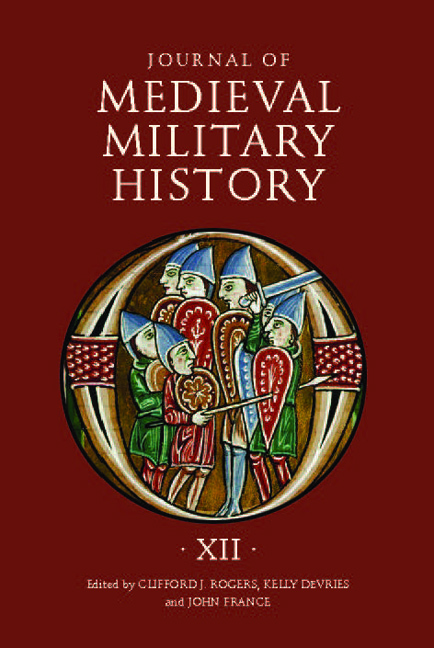Book contents
- Frontmatter
- Contents
- List of Illustrations and Map
- 1 Some Observations Regarding Barbarian Military Demography: Geiseric's Census of 429 and Its Implications
- 2 War Words and Battle Spears: The kesja and kesjulag in Old Norse Literature
- 3 The Political and Military Agency of Ecclesiastical Leaders in Anglo-Norman England: 1066–1154
- 4 Couched Lance and Mounted Shock Combat in the East: The Georgian Experience
- 5 The Battle of Arsur: A Short-Lived Victory
- 6 Prelude to Kephissos (1311): An Analysis of the Battle of Apros (1305)
- 7 Horse Restoration (Restaurum Equorum) in the Army of Henry of Grosmont, 1345: A Benefit of Military Service in the Hundred Years' War
- 8 The Indenture between Edward III and the Black Prince for the Prince's Expedition to Gascony, 10 July 1355
- 9 Investigating the Socio-Economic Origins of English Archers in the Second Half of the Fourteenth Century
- 10 War and the Great Schism: Military Factors Determining Allegiances in Iberai
- List of Contributors
- Journal of Medieval Military History 1477–545X
3 - The Political and Military Agency of Ecclesiastical Leaders in Anglo-Norman England: 1066–1154
Published online by Cambridge University Press: 05 November 2014
- Frontmatter
- Contents
- List of Illustrations and Map
- 1 Some Observations Regarding Barbarian Military Demography: Geiseric's Census of 429 and Its Implications
- 2 War Words and Battle Spears: The kesja and kesjulag in Old Norse Literature
- 3 The Political and Military Agency of Ecclesiastical Leaders in Anglo-Norman England: 1066–1154
- 4 Couched Lance and Mounted Shock Combat in the East: The Georgian Experience
- 5 The Battle of Arsur: A Short-Lived Victory
- 6 Prelude to Kephissos (1311): An Analysis of the Battle of Apros (1305)
- 7 Horse Restoration (Restaurum Equorum) in the Army of Henry of Grosmont, 1345: A Benefit of Military Service in the Hundred Years' War
- 8 The Indenture between Edward III and the Black Prince for the Prince's Expedition to Gascony, 10 July 1355
- 9 Investigating the Socio-Economic Origins of English Archers in the Second Half of the Fourteenth Century
- 10 War and the Great Schism: Military Factors Determining Allegiances in Iberai
- List of Contributors
- Journal of Medieval Military History 1477–545X
Summary
The civil war between King Stephen of England (r. 1135–54) and Empress Maud has long been a period of interest for medieval historians. During this violent and destructive time centralized authority largely fragmented and fell into the hands of the local and regional nobility, including ecclesiastical lords. Contemporary observers, such as the compiler of the Anglo-Saxon Chronicle, complained that God had forsaken England and it was “said openly that Christ and His saints slept.” In the midst of societal and governmental upheaval ecclesiastical lords, primarily bishops, became both protectors and despoilers of the countryside. The author of the Gesta Stephani (himself perhaps a bishop) complained that bishops were behaving in much the same fashion as secular lords in warfare:
Others (but it was no task for bishops) filled their castles full of provisions and stocks of arms, knights, and archers, and though they were supposed to be warding off the evildoers who were plundering the goods of the Church showed themselves always more cruel and more merciless than those very evil-doers in oppressing their neighbours and plundering their goods. Likewise the bishops, the bishops themselves, though I am ashamed to say it, not indeed all but a great many out of the whole number, girt with swords and wearing magnificent suits of armour, rode on horseback with the haughtiest destroyers of the country and took their share of the spoil.
- Type
- Chapter
- Information
- Journal of Medieval Military HistoryVolume XII, pp. 51 - 80Publisher: Boydell & BrewerPrint publication year: 2014



